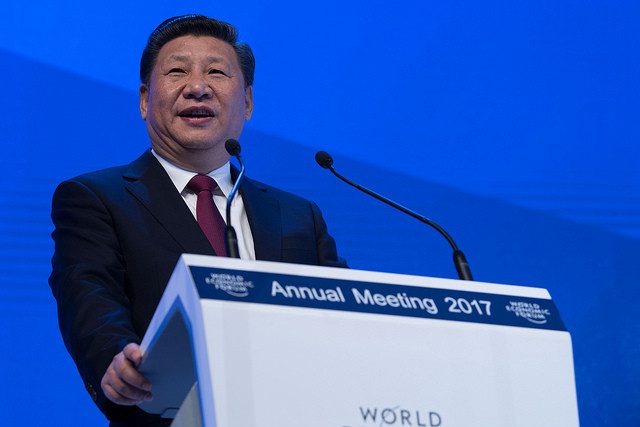“Heaven rewards the diligent,” the Chinese president said, applauding his country’s achievements. The march of history towards economic liberalisation was irreversible, he said at another point, restating China’s commitment to free trade.
Then he slipped in a Chinese proverb: “Heaven has its own law and those who embrace it will prosper.” The saying, meant to celebrate China’s unique blend of socialism and a market-driven economy, contained another message: that China would continue to play by its own rules.
Xi’s remarks – his first public comments since Beijing and Washington began sparring over tariffs – at first appeared conciliatory. He pledged to further open up China’s financial services sector, lower tariffs on car imports, encourage other imports and better protect intellectual property – the latter issue being one of the key grievances of Donald Trump’s White House.
But US investors and businesses have been hearing most of these promises for at least the past two years. Some of the pledges will have minimal impact. For instance, lowering import duties on cars will benefit relatively few US companies, most of which already produce and ship their vehicles from within China.
Xi also promised to open up China’s shipbuilding and manufacturing sectors, though Andrew Collier, the managing director of Orient Capital Research, noted that manufacturing had been relatively accessible to foreign investors since China joined the World Trade Organisation in 2001. “Xi delivered a masterful, carefully framed, conciliatory response to Trump,” Collier said.
The US president said on Tuesday after Xi’s speech that he was “very thankful” for the Chinese leader’s pledges on tariffs and the car industry. “We will make great progress together!” he tweeted.
The US has threatened to impose tariffs on as much as $150bn of Chinese imports in response to what it says are unfair Chinese trade policies that protect domestic markets while forcing foreign companies to hand over their technology and intellectual property. China has responded with its own list of US goods it could levy, including soya beans, aircraft and other major US exports, many of which come from battleground states influential in upcoming midterm elections.
“China seems to have gotten a lot of mileage from Xi’s rote statements and minor concessions that Trump has turned around and spun as evidence of his deal-making prowess,” said Eswar Prasad, a senior professor on trade policy at Cornell University in the US and senior fellow at the Brookings Institution.
Xi’s speech, which had been expected to set out bold reforms, was instead similar to his remarks in Davos last year. In that speech he framed China as the world’s new champion of free trade in an implicit rebuke to Trump. On Tuesday Xi again emphasised China’s commitment to economic openness.
“China’s cheek is something to behold given that they are building a new international order alongside the one they pledged to leave undisturbed,” wrote Richard McGregor, a senior fellow at the Lowy Institute in Sydney. One of China’s key industrial policies is aimed at replacing foreign technology with domestically made components and establishing Chinese companies as global champions. Much of the White House’s tariffs target the policy, known as Made in China 2020.
Xi’s comments, while offering little, may still be enough to tamp down escalating rhetoric. Some of the measures Xi named appear to be moving forward, which could also help. The People’s Bank of China said on Wednesday that previously announced moves to put foreign companies on an equal footing with domestic rivals in the financial services sector would be implemented by the end of the year.
“China is laying a preliminary foundation to talk with the US,” said Pang Zhongying, a Beijing-based international relations expert. “I think the time is gradually coming for China and the US to negotiate.”
Lily Kuo
Additional reporting by Wang Xueying
